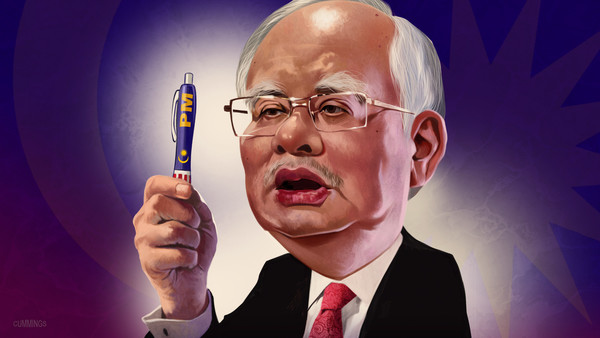Accusations swirling around the prime minister have transfixed Malaysia, writes David Pilling

This weekend tens of thousands of Malaysians will pour on to the streets of Kuala Lumpur
to shout the name of their prime minister, Najib Razak. They will be
coming not to praise him, but to bury him. Among the most popular chants
is likely to be “Tangkap Najib”, or “Arrest Najib”.
Now 61, with receding grey hair, neatly trimmed moustache and bespoke suits, Dato’ Sri Mohammad Najib bin Tun Haji Abdul Razak, to give him his full title, can seem a dapper liberal with progressive views on economics and racial harmony. “Najib is the best hope for moderation and reform,” says Sholto Byrnes, senior fellow at the Institute of Strategic and International Studies.
Yet there is another side to Mr Najib, who has been prime minister since 2009, says John Malott, a former US ambassador to Malaysia. The real man, who at 23 became the youngest parliamentarian in his nation’s history, is, he says, neck-deep in the racially divisive, money-soaked politics of the United Malays National Organisation, which has governed continuously for nearly six decades. The “fake, Najib”, he says, is the product of millions of dollars spent on slick public relations.
These days, Mr Najib’s PR is not so good. He is caught in a financial scandal that has transfixed Malaysia, an ethnically and religiously diverse South-east Asian nation of 30m people. He recently admitted receiving nearly $700m in his private bank account. The money, he said, in a version corroborated by Malaysia’s anti-corruption commission, came from an unnamed Middle Eastern donor. He had broken no laws, he said.
Another version of events, however, links the money to 1Malaysia Development Berhad,
or 1MDB. Set up in 2009 by Mr Najib, who chairs its advisory board,
1MDB ostensibly aimed to foster new domestic industries. Instead, it has
piled up $11bn in debts, buying land and ageing power stations at home
and abroad. According to an account
in the Sarawak Report, a UK-based blog, and the Wall Street Journal,
money from companies and banks linked to 1MDB was allegedly transferred
into the prime minister’s account. Mr Najib has denied any link between
the $700m and 1MDB.
Podcast
Scandal rocks Malaysia’s ruling party
A political crisis has erupted in Malaysia involving questions about how nearly $700m made its way into the prime minister’s personal bank account and the mismanagement of the country’s sovereign development fund. Ben Bland talks to David Pilling, the FT’s Asia editor, about the scandal.
“But he’s turned into a person who doesn’t care for the country, who doesn’t bother with accountability. All he cares about is staying in power.”
The grubby political scandal is a long way from Mr Najib’s patrician roots as the son of Malaysia’s second prime minister, Abdul Razak Hussein, and the nephew of its third, Hussein Onn. Educated in Britain, first at Malvern College in Worcestershire, then at Nottingham University, where he studied industrial economics, Mr Najib appears “very polished, very debonair”, says Mr Malott.
Many western leaders have been charmed by Mr Najib’s performance. The swirling 1MDB scandal notwithstanding, David Cameron, UK prime minister, visited him in Kuala Lumpur just last month, and Barack Obama, US president, found time to host him for a round of golf in Hawaii last December.
But his “doublespeak” has confounded Malaysians, says Eddin Khoo, a Malaysian writer, especially since he came into office brandishing a liberal message of political tolerance and racial harmony. Instead, he failed to repeal the hated sedition act and courted hardline Islamists seeking to impose a form of sharia law. The leader of the opposition, Anwar Ibrahim, has been jailed on charges of sodomy.
Mr Najib’s government floundered when Malaysia Airlines Flight 370 disappeared last year. Now the economy is reeling, with the ringgit sliding to 17-year lows and the stock market tanking.
This is not the first time Mr Najib has faced controversy. On his seemingly effortless path to the premiership, there were alleged links to corruption over a French submarine contract, though he denied any wrongdoing. More recently, two of his former bodyguards were convicted of murdering a model. Mr Najib said he had never even met the victim.
Many say Mr Najib changed after he married his second wife, Rosmah Mansor, in the late-1980s. Rosmah has been relentlessly mocked on social media for alleged high-spending and vulgar taste, with images showing her clutching one of multiple Birkin handbags, which retail at between $9,000 and $150,000 each. Even Mr Najib’s brother, Nazir, a prominent banker, has contrasted the prime minister’s allegedly extravagant lifestyle with that of their late father, a leader known for his simple integrity.
Street protests, rumours of plots within his cabinet and continuing investigations into 1MDB make these uncomfortable times for Mr Najib. Still, he is soldiering on. “Let no one doubt: I will continue to serve and lead this nation,” he told an audience at the Institute of Management in Kuala Lumpur last week. At least no one there shouted “Arrest Najib”.
The writer is the FT’s Asia editor

No comments:
Post a Comment